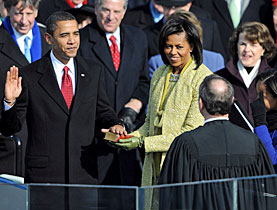A Swiss home for Guantánamo ex-inmates?

Switzerland is prepared to consider accepting prisoners released from Guantánamo, the government said on Wednesday.
A statement released to the media said the government had told the United States government that it welcomed a decision by the new president, Barack Obama, to close the military prison at the US airbase on Cuba as soon as possible.
It repeated that Switzerland considers the imprisonment of people at the base to be contrary to international law.
Switzerland is ready to see how it can help solve the Guantánamo problem, and specifically whether it can take any of the prisoners. This would require a thorough and careful examination of the legal implications and security considerations, the statement said.
Change of heart?
In November, the Swiss Migration Office turned down asylum requests from three Gunatánamo inmates – a Libyan, an Algerian and a Chinese. The human rights organisation, Amnesty International, is supporting an appeal against this decision being made to the Federal Aministrative Court.
They had made their asylum applications after US authorities signalled they were free to leave after seven years imprisonment if they found a safe haven.
In December the US made an official request to Switzerland to accept inmates who were being released for lack of charges. On that occasion the government undertook to examine the request “extremely closely”.
However, Justice Minister Eveline Widmer-Schlumpf said in a newspaper interview earlier this month that “the United States created Guantánamo and therefore they must solve the problem”. But she did not rule out Switzerland joining in a European solution.
The Guantánamo problem
During his inauguration address on Tuesday, Obama highlighted the idea of respect for justice the rights of the individual.
He had already repeatedly promised to close the Guantánamo camp where over 200 inmates are still held on suspicion of having links to terrorism.
On Obama’s orders, prosecutors have now asked military judges to halt all cases at the Guantánamo tribunals for 120 days.
Human rights organisations have accused the US of holding inmates for years without being charged and many prisoners have complained of abuse. Most of the 600 people who have so far been released had not been tried. Their release came because investigators determined that they did not pose a risk to the US.
Swiss jurist and member of parliament Dick Marty, who in 2005 led an investigation by the Council of Europe into alleged illegal CIA secret prisons Europe, called the suspension of trials a “positive sign”, but pointed out that closure of Guantánamo would be difficult.
“The problem is, no-one knows how Guantánamo can be closed,” he said. Many of the inmates would be in danger if they returned home, and Washington could be faced with legal cases brought by ex-prisoners demanding restitution for wrongful detention.
Marty called on all those European countries which had criticised Guantánamo to “make an effort” to grant asylum to detainees when they were released.
He said the Swiss parliamentary group for human rights, of which he is a member, would discuss the issue of accepting released prisoners with Foreign Minister Micheline Calmy-Rey in the next few weeks.
swissinfo with agencies
The first prisoners were transferred to the detention camp in Guantánamo Bay in Cuba on January 11 2002.
The US government designated them “enemy combatants”, and declared that they were not covered by the Geneva Conventions which safeguard the rights of prisoners of war.
At its highest point the prison population reached 800.
There are currently just under 250 left.
Many detainees were eventually ruled not to have links with terrorist groups, but fear arrest and torture if they returned to their own countries.
This is why third country solutions need to be found for them.
US President Barack Obama long criticised the interrogation practices used, saying they amounted to torture.

In compliance with the JTI standards
More: SWI swissinfo.ch certified by the Journalism Trust Initiative











You can find an overview of ongoing debates with our journalists here . Please join us!
If you want to start a conversation about a topic raised in this article or want to report factual errors, email us at english@swissinfo.ch.